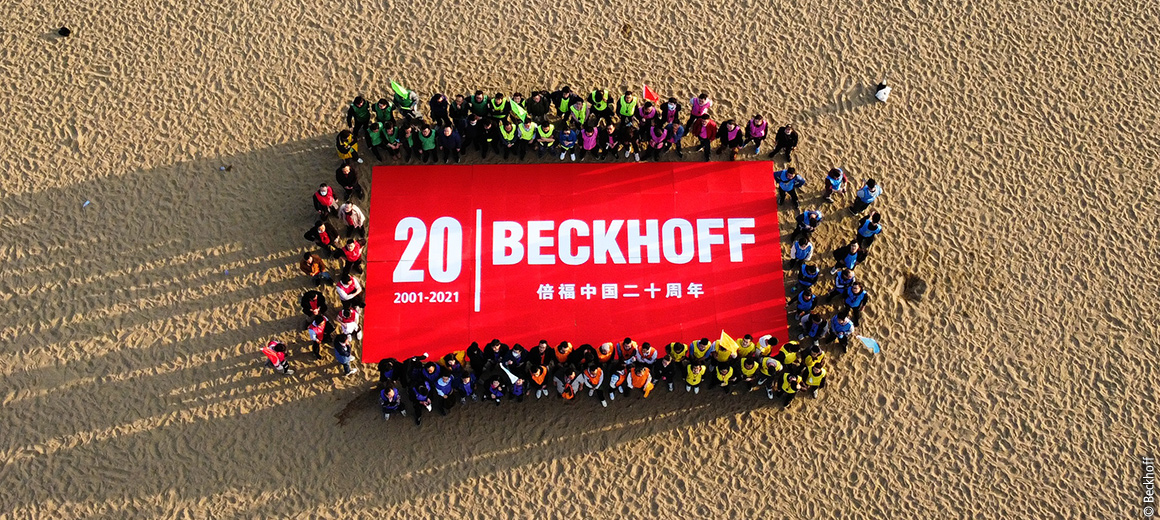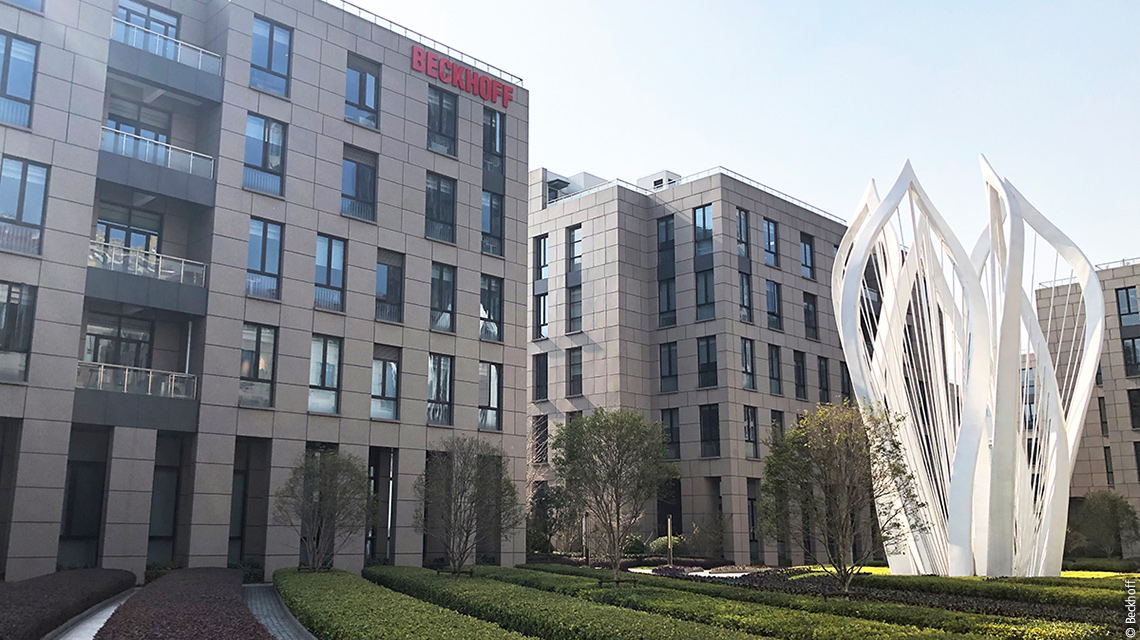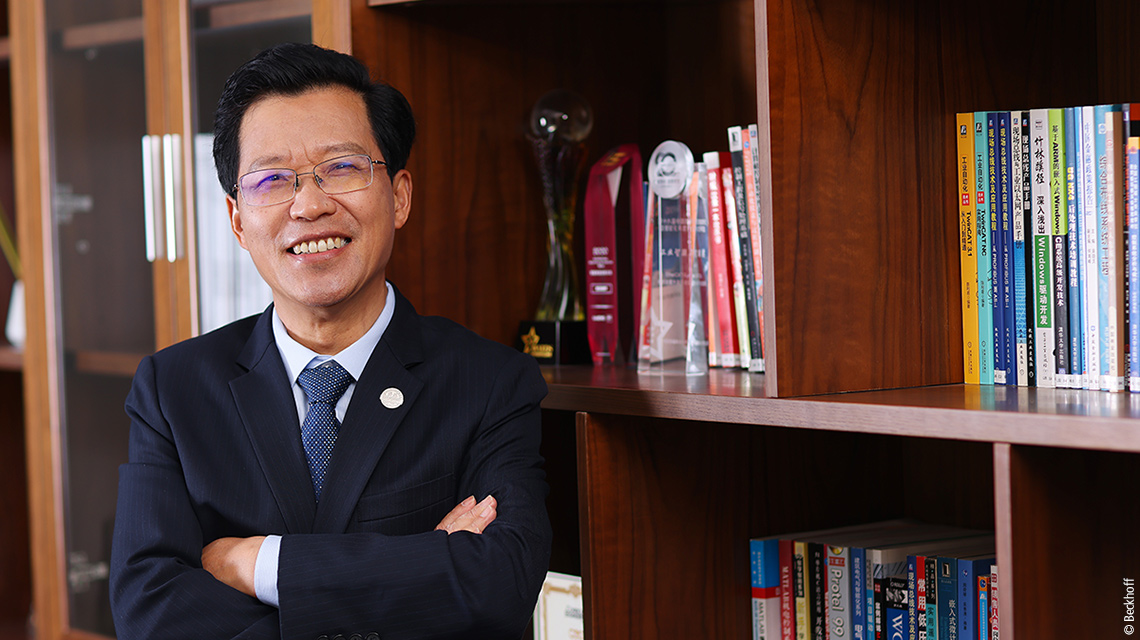

Interview with Managing Director Xingkai Ma of the Chinese Beckhoff subsidiary
With a first sales office established in Beijing in 2001, Beckhoff started to build up its local presence in China. In this interview, Managing Director Xingkai Ma describes the successful path from these beginnings to the development of an independent subsidiary that is currently serving the Chinese market with approximately 280 employees and 26 technical and sales offices distributed across the country.

What have been the most important development steps of Beckhoff China in the past 20 years?
Xingkai Ma: Looking back on the last 20 years of development of Beckhoff China, we can roughly divide it into three stages:
The first stage was from 2001 to 2006. In 2001, Beckhoff opened its first representative office in Beijing, to enter China’s markets. However, in those days, companies in China’s automation industry still had many doubts about PC-based control technology. We then decided to use our fieldbus I/O modules as the market entry point. Meanwhile, we continued to cultivate China’s market via a variety of technical trainings, seminars and tradeshows. With the introduction of a series of new products, represented by the CX1xxx Embedded PC and servo drive series, we were finally in a position to provide our customers with complete and open automation solutions.
The second stage was from 2007 to 2018. In 2007, a wholly owned subsidiary company of the Beckhoff group was legally established in Shanghai. With the rise of China's wind energy market, Beckhoff China entered a period of rapid development. With this in mind, we quickly established a local team for wind application engineering and sales in China. This was facilitated by support of the wind energy team from the Beckhoff German headquarters, especially from the Lübeck office, to accelerate project development and improve our local service capabilities. This helped us gradually dominate the control system market in China’s wind energy industry. In the meantime, Embedded PCs from Beckhoff have become the mainstream controllers for wind turbines in the megawatt range in China, with a market share of over 50%. Along with our success in the wind energy market, our business in China and our local sales and technical teams expanded rapidly, leading to breakthroughs in key industries, such as photovoltaics, semiconductors, sheet metal working, tobacco machines, packaging, etc. In 2014, – the real-time Industrial Ethernet technology EtherCAT became a recommended national communication standard (GB/T 31230) in China. Overall, PC- and EtherCAT-based control technology was becoming increasingly accepted by Chinese customers in this phase.
The third stage started in 2019, when the Shanghai HQ team moved into a brand-new office building with a total area of 4,000 square meters, forming a solid foundation for the company's greater development in the future. With the new offices opening all over the country, Beckhoff China is currently presented in 27 large and medium-sized cities and its number of employees has been increased to 280. With annual sales of 1.4 billion yuan (approximately 185 million euros), our products and solutions are widely used in many industries and we have established our position as a technology leader in China’s automation market. In particular, we have achieved 27% sales growth in 2020 despite the huge impact of the COVID-19 crisis, contributing to positive annual growth for Beckhoff worldwide.

Are there specific features of the Chinese market and what are the corresponding advantages of PC-based control in this context?
Xingkai Ma: China’s automation market is an open and highly competitive market, and Chinese customers have varying requirements regarding control technology. Due to its openness and scalability, PC-based control technology supports the most diverse programming languages and mainstream industrial communication protocols in an ideal way, and seamlessly integrates computer technology, Internet technology and automation technology. It makes it possible to provide Chinese customers from different industries with modular and scalable control solutions tailored to their application requirements, such as budget, performance class and the complexity of the control tasks. In the meantime, compared to equipment manufacturers in Europe and the U.S., Chinese customers prefer automation suppliers that can offer complete solutions. Upon entering China's market, we were keenly aware of this demand and developed a series of standard solutions for the OEM market including some complex application algorithms, which helped us meet the practical demands of our customers and made a considerable contribution to the rapid growth of Beckhoff China. In recent years, local OEMs have become stronger and more ambitious in the context of intelligent manufacturing. They want to increase their competitive edge in China’s market and also the international market. With features like high computing power, convenient communication and platform interoperability, PC-based control technology provides the technical basis for the realization of Industrie 4.0 and intelligent manufacturing concepts.
What are the main user industries in China and the related solutions from Beckhoff?
Xingkai Ma: As China’s renewable energy sector continues to heat up, Beckhoff China has seized the market opportunity, and its local wind energy and photovoltaic businesses are growing rapidly with an increasing market share. PC-based control technology is widely used in wind turbine control, pitch control and windfarm networking. Our products have been used in all areas of the photovoltaic industry, ranging from crystal silicon furnaces and polycrystalline ingot furnaces to solar panel manufacturing Moreover, we have also made huge progress in the field of lithium battery manufacturing. The PC-based tension control solution from Beckhoff has been applied in production lines of some of the leading Chinese lithium battery manufacturers, and XTS (eXtended Transportation System) has also been successfully applied in many industries. China’s semiconductor industry has experienced rapid growth in recent years, and Beckhoff China works hand in hand with the customers in this market, aiming to grow together. Our innovative technologies have been applied to a variety of core equipment in semiconductor production, such as lithography machines, PVDs, CMP, ion implanters and cleaning equipment.
We have also maintained steady growth in traditional industries, such as sheet metal working, packaging, automotive, tobacco and electronics manufacturing. We have developed intelligent laser blanking line solutions in the field of laser cutting; we have also developed PackML- and TwinCAT HMI-based solutions for packaging and material handling machines. Our XTS systems have also been successfully used in optical inspection machines for COVID-19 vaccine production.
We found that Chinese customers are willing to accept and try new solutions. In 2020, we finished several globally leading applications, including:
- The first wind turbine worldwide with the new TwinCAT/BSD operating system has been successfully connected to the grid in Henan province.
- The first machine learning project has been successfully implemented by Beckhoff at a customer’s site in Tianjin, with several production lines in the process of being deployed.
- Beckhoff China, Huawei, China Mobile and Kunming Shipbuilding Equipment Co., Ltd. (KSEC) have jointly issued a White Paper on 5G Application Scenarios and Solutions for Smart Logistics, to build China’s first new equipment incubator for 5G full-scenario smart logistics.
How do you see the current company development and the outlook for the near future?
Xingkai Ma: We welcomed the New Year 2021 with a very good beginning. The surge we observed in incoming orders in the first quarter gives us the confidence to boldly predict that Beckhoff China will continue double-digit sales growth in 2021. To be closer to the market and provide better services for our customers, we will continue to expand our sales networks in the future by establishing new sales offices and technical support offices to cover more regions in China. We also plan to continue to expand the storage capacity of our product warehouse in Shanghai, to guarantee continuous and steady product supply for our customers. Furthermore, the company’s growth is supported by excellent talents. Hence in 2021, we will expand the scale of external recruitment, actively seek gifted people, cultivate talents internally and continuously improve the personnel reserves as well. In the future, the Chinese economy is well poised to keep the momentum of stable growth, so the Chinese market has unlimited potential. We will conform to the policy direction of the Chinese market to seize the opportunities presented by digital transformation and leverage the advantages of PC-based control technology as we aim to continue to create genuine added value for our customers in upcoming applications such as industrial 5G, machine learning, AI, industrial big data analysis and cloud services.
Anniversary heralds generational change

As the previous managing director, Liqiang Liang has played a significant role in the 20 exceptionally successful years of Beckhoff China. He has been responsible for the sales of Beckhoff products in China since 1997 – at the time with distributor Conuco – and he opened the first Chinese Beckhoff sales office in Beijing in 2001. As a 'man of the first hour', he built up what is now the world's largest Beckhoff subsidiary with the highest growth rates. In January 2021, on the occasion of the company's anniversary, he passed the baton to the next generation: Managing Director Xingkai Ma. To ensure a smooth and successful generational transition, Liqiang Liang will initially continue to support him as Executive Director. Liqiang Liang: "The main reason for proposing '倍福' as the Chinese name of Beckhoff at the time of foundation was because I thought the Chinese pronunciation of the first letter ‘B’ and the last letter ‘F’ of Beckhoff implies Double Happiness." And further: “We will integrate control technology with information, communication and industrial Internet technologies, in order to realize the replacement of traditional human laborers with plants and machines where appropriate. Furthermore, the replacement of ‘brainworkers’ by software and data integration will not only determine the future development of intelligent manufacturing, but also the mission and opportunity of automation industry.”